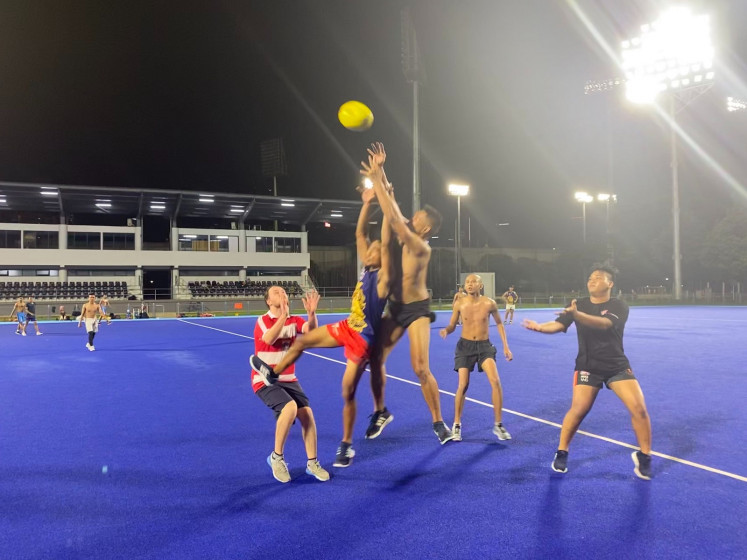Popular Reads
Top Results
Can't find what you're looking for?
View all search resultsPopular Reads
Top Results
Can't find what you're looking for?
View all search resultsAustralian football team Jakarta Bintangs kicking goals with local community
The Bintangs were established in 1995 as an outlet for Australian expats missing their home sport. However, the team has transformed into much more than that.
Change text size
Gift Premium Articles
to Anyone
I
magine you’re sitting on the sidelines of a hockey field expecting to see a group of children run out with sticks in hand. Instead, you’re greeted by group of men, united by a distorted egg-shaped ball. The men, who are part of the Jakarta Bintangs team, are actually playing Australian rules football.
Having to train for a sport that’s typically played on a grass oval with four goal posts on an astroturf hockey field should be an indication that the men don’t belong, but the Bintangs have well and truly made their mark on the local community.
The Bintangs were established in 1995 as an outlet for Australian expats missing their home sport. However, the team has transformed into much more than that. Since their establishment almost 25 years ago, the Bintangs have grown to accommodate not only expatriates but local Indonesians as well.
Through the inclusivity of the Jakarta Bintangs, the locals have been able to establish their own team, the Indonesian Garudas. Bintangs’ captain, Kalen Iselt, recently told The Jakarta Post that a number of Indonesian players have coordinated a leadership group of their own, which has been put to the test in exhibition matches.
“We challenged them to make their own team, and for matches like Australia Day, they played against us and they take it upon themselves,” said Iselt.
Read also: ‘Anak Garuda’, an incredible true story of students becoming entrepreneurs
Friendly competition: Players from the Bintangs and Garudas train alongside one another at Gelora Bung Karno Sports Complex in Central Jakarta on Jan. 30. (JP/Madison Bogisch)The Bintangs’ captain recognizes the impact the locals have on the team, saying many have proven to be integral. “Some of the Indonesian players have been with the club for 15 years, a lot longer than some of the expats here.”
Some of the current local players started their Australian football tenures as children living in Mama Sayang Orphanage, located in West Java. Now, in order for the Bintangs to help educate the younger children coming through the orphanage, boys and girls from Mama Sayang often train with the team.
“[Playing Australian football] provides them with a good platform for staying active and keeping out of trouble,” said Iselt.
When contacted by the Post, the founder of Mama Sayang Orphanage, Mike Hilliard, agreed that the children’s involvement with the Jakarta Bintangs helped to keep them safe, “[…] they were certainly more agile and fewer tried to do various [negative] tasks.”
Having grown up in Mama Sayang, Jakarta Bintangs member and longtime Australian football enthusiast Michael Alexander Latupeirissa said being given the opportunity to play a sport he loves has changed his life. “This team has had a big impact on my life. […] The Garudas, the expats and the locals, they’re not just our friends; they’re our family.”
Before turning to Australian football, Michael said he lacked discipline and leadership. Now, the 22-year-old Indonesian is thought to be one of the strongest players on the team, having the ability to lead the Garudas himself.
Being part of the team has benefited many of the other young boys, not only psychologically but also experientially, by allowing them to travel for football matches. The Bintangs frequently travel both nationally and internationally.
Having recently traveled to Bali for matches against the Bali Geckos and Thailand Tigers, the Bintangs took a selection of local players at the team’s expense to enable them to play.
“We have many local players here, and the Bintangs give us experiences we can’t give ourselves,” Michael said.
When discussing the importance of the players they endearingly call the “Indo boys”, Bintangs president Ben Giles, told the Post the team would do anything to support the talented young footballers.
“We do what we can to make them equal members of our team,” Giles said.
Alongside their work with Mama Sayang, the Bintangs have also implemented a school program to educate young locals about Australia’s favorite sport. “We have just engaged one of our local players to recommence the program of going out to 30 [junior and senior] schools around Jakarta,” Giles said.
Starting in March, a volunteer from Melbourne, Australia, will work with the local development officer for six months to share the Bintangs’ passion for Australian football with the younger generation.
Michael believes the school program is a great opportunity to recruit younger players and that the team will only get better over the coming years because of it. “I’m excited for the younger kids coming through,” he said.
What started as a group of expats bonding over Australian football has turned into an inclusive outlet for people from all walks of life.
“We’re just people who like to play footy. We’re not out to save the world,” Giles said.
Despite this, the work the Jakarta Bintangs do off the field in support of the local community is a good indication that they have proven to be more than your typical sporting club. (kes)
__________
Madison Bogisch traveled to Indonesia under a program with ACICIS Study Indonesia.












